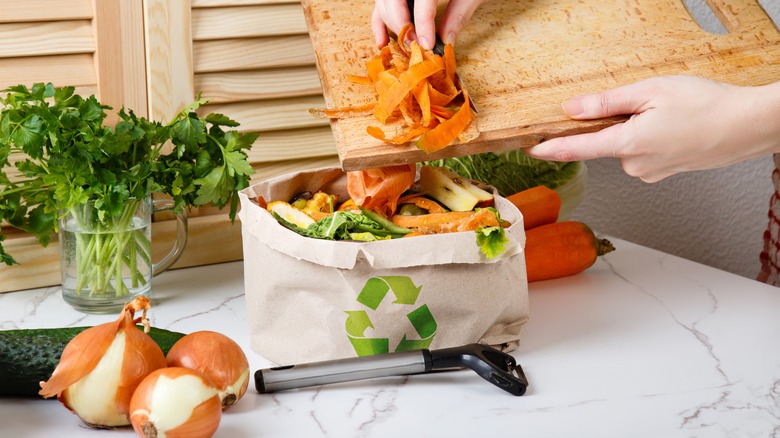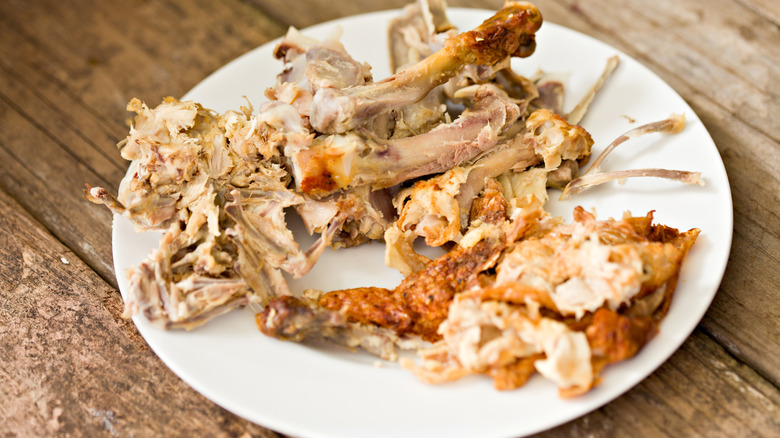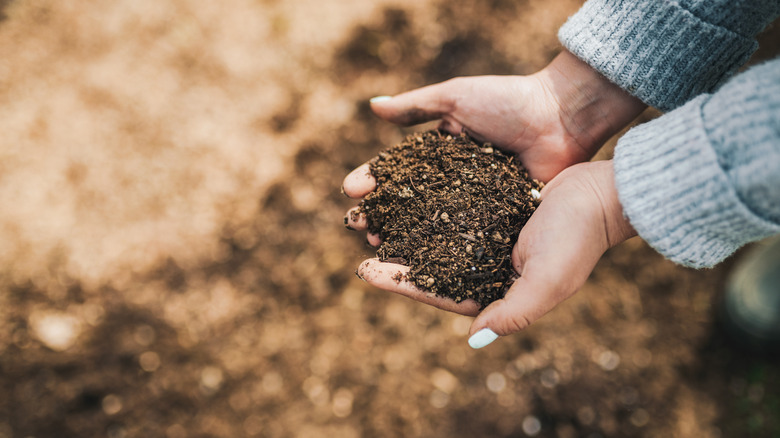Don't Throw Out These Kitchen Scraps, Use Them In A DIY Plant Fertilizer Instead
We may receive a commission on purchases made from links.
Plants benefit from fertilizers in general because they provide essential nutrients that are necessary for their growth and development. Fertilizers supply plants with elements such as nitrogen, phosphorus, and potassium, which are crucial for various physiological processes. Nitrogen promotes leaf and stem growth, phosphorus supports root development and flowering, and potassium enhances overall plant health and disease resistance. Fertilizers also help replenish nutrient deficiencies in the soil, ensuring that plants have access to a balanced and adequate supply of nutrients. To ensure your plants are receiving the proper nutrition, consider saving animal bones from your meals to create your own bone meal.
When making your own bone meal fertilizer, it is important to choose bones that are suitable for this purpose. Chicken bones are a popular choice for making bone meal fertilizer. They are readily available and contain a good amount of phosphorus, which is essential for root development, flowering, and fruiting. Additionally, chicken bones are relatively small and easy to crush or grind into a fine powder. Fish bones are another excellent option for bone meal fertilizer. They are rich in phosphorus and also contain other beneficial nutrients such as calcium and omega-3 fatty acids. Fish bones are typically softer and easier to grind, making them ideal for creating a fine powder. Lastly, beef bones, particularly those from joints or marrow, can also be used to make bone meal fertilizer. however, these bones are larger and may require more effort to crush or grind.
How to make and apply your bone meal fertilizer
Bone meal fertilizer is a natural fertilizer and an effective way to provide essential nutrients to plants. To make bone meal fertilizer, start by collecting bones from meat or fish that you have cooked. Boil the bones first to break down any remaining meat or fat on the bones. After, you'll need to bake them in the oven until they become brittle enough to grind. For larger bones, the baking time will take longer, while small, hollow bones may be soft enough after boiling. Once the bones are ready, you can either crush them manually using a mortar and pestle or grind them in a blender or food processor until they become a fine powder.
To apply the bone meal fertilizer to your plants, it's best done when planting or transplanting. Sprinkle a small amount of bone meal fertilizer, about a tablespoon, into the hole or trench into which you'll place your plants, making sure to distribute it evenly. Then, cover the bone meal with a layer of soil and gently press it down to secure it in place. Finally, water the plant thoroughly to help the bone meal dissolve and release its nutrients into the soil. It is important to note that bone meal fertilizer is slow-release, meaning that it gradually releases nutrients over time. Only apply bone meal fertilizer during the planting or transplanting stage, as it will provide a steady supply of phosphorus to support root development.
Why bone meal fertilizer benefits your plants
Making your own bone meal fertilizer for your plants offers several benefits. Bone meal is a natural and effective source of essential nutrients. By utilizing food scraps to fertilize your garden, you can create a cost-effective and sustainable fertilizer option. One of the main benefits of bone meal fertilizer is its slow release, as this characteristic ensures a steady supply of phosphorus to plants, providing them with a continuous source of food throughout their growth cycle. This is particularly beneficial during the planting or transplanting stage, as it supports root development and helps plants establish themselves in their new environment.
Furthermore, bone meal fertilizer is organic and environmentally friendly. By making your own, you are reducing waste by utilizing kitchen scraps that would otherwise end up in the trash. This promotes sustainability and reduces the need for synthetic fertilizers, which can have negative environmental impacts.
If animal bones are not a common kitchen scrap in your house, you can also purchase bone meal fertilizer for your plants in garden centers, hardware stores, or even online. Through Amazon Prime, Burpee offers a 3-lbs bag of fertilizer that can be mixed into potting soil for added nutrition. It's available for $12.99 and it is a certified organic product that claims to enrich the soil with more nitrogen that will help your plant's roots grow, which is particularly useful for flowering bulb plants in the fall.


